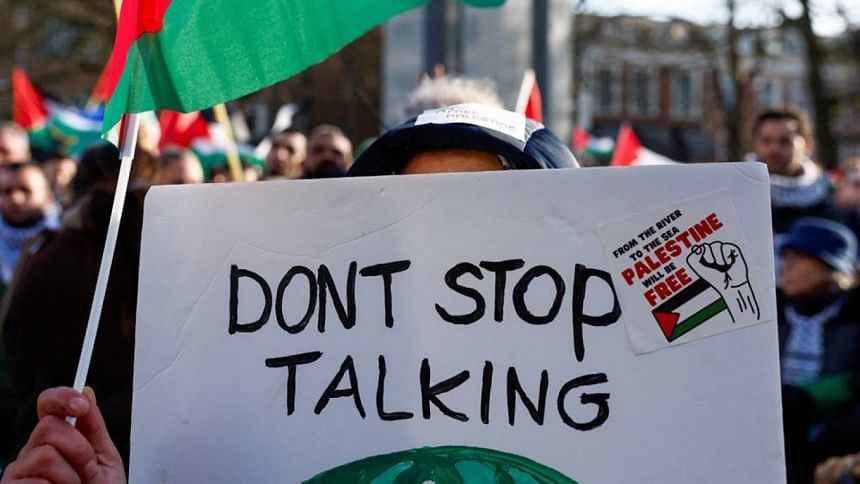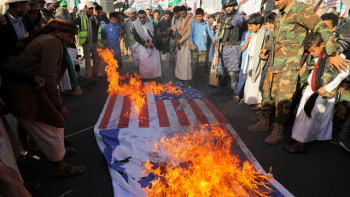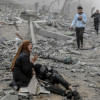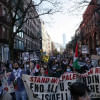ICJ interim ruling on Israel’s war on Gaza: Unsurprisingly disappointing

The International Court of Justice (ICJ), in its interim ruling on Israel's war on Gaza, has fallen short on calling for an immediate ceasefire and failed to directly order Israel to halt its bloody aggression. However, the ICJ did reject Israel's claim that the court did not have the jurisdiction to hear South Africa's case, as evidence for the genocide case has been found. The World Court, the judicial body of the UN, has also recommended provisional measures calling on Israel to adhere to the 1948 Genocide Convention and prevent genocidal acts in Gaza, among a total of six orders.
While overall, the world community is seeing the ICJ ruling as a positive development for the Palestinians—since it can now be said that Israel is being officially investigated for genocidal acts in Gaza—the court's failure to call for an immediate ceasefire has disappointed the Palestinians, who continue to endure indiscriminate bombing by Israel.
ICJ's failure to ask Israel to immediately halt the aggression in Gaza comes as a stark contrast to its stance in the Ukraine war, where it had unequivocally ordered Russia to "immediately suspend" its military operations in Ukraine, which Russia chose to ignore. This apparent double standard in the treatment of Ukraine versus Gaza—despite the latter shouldering a heavier humanitarian toll, with more than 26,000 deaths (10,000 being children)—raises questions about the potential pro-Western bias of ICJ prosecutors.
Not that the ICJ call for an immediate ceasefire would have had any direct impact on Israel's actions, which has already rejected the World Court's rulings, with Netanyahu boldly stating that it would continue its attacks on Gaza as self-defence. Although how an occupying state attacking its helpless occupied population constitutes self-defence remains a major controversy, which no party is willing to investigate or address.
Article 51 of the UN Charter states that "nothing in the present Charter shall impair the inherent right of individual or collective self-defence if an armed attack occurs against a member of the United Nations..." But Israel was not threatened by Palestine; even the October 7 attacks did not happen in a vacuum, as the US Secretary-General himself has said. UN Special Rapporteur on the Occupied Palestinian Territories Francesca Albanese had also suggested that "The right to self-defence can be invoked when the state is threatened by another state, which is not the case [with Israel]."
It is an obvious question: on what grounds is Israel claiming that it is razing Gaza to the ground, indiscriminately killing civilians, displacing millions, and dismantling civilian infrastructures as "self-defence"?
In fact, after the ICJ ruling, Israeli Finance Minister Bezalel Smotrich reportedly said that the "...judges of The Hague, who are concerned about the residents of Gaza, should invite countries to receive them [residents] and help rebuild Gaza." While this statement demonstrates the Israeli ultra right-wing government's total disregard for international humanitarian laws or judicial bodies, it also once again clearly exposes the occupation state's genocidal intent against the Palestinians, which it is carrying out with ruthless barbarism.
Still, the ICJ-recommended provisional measures would make it harder for Israel's main ally and backer, the United States, to continue its iron-clad support for the genocide state.
While the ICJ does not have the authority to enforce its rulings, South Africa can now take this matter to the UN Security Council for a resolution asking for Israel to adhere to the UN court's recommendations. While in the past, the US had unabashedly used its veto power to protect Israel from facing any kind of pressure or accountability from the UN, vetoing a resolution focused on Israel following the ICJ-ordered measures will not only be difficult for the US, but such an action will put into question the country's moral compass as the leader of the free world—one that always talks about upholding human rights and international humanitarian law. The US' interventions in cases such as the Ukraine war or the Taiwan issue will not hold water.
Under mounting moral pressure, if the US relents and a resolution is passed by the UNSC asking Israel to adhere to the ICJ provisional measures, it will mean either Israel mends its ways or exposes itself to being subjected to punitive measures, which could include arms embargo, economic sanctions, travel bans, and even facing an international force. In 1990, for instance, during the Iraqi invasion of Kuwait, the UNSC adopted Resolution 665, authorising a naval blockade to enforce an embargo against Iraq as per the previous Resolutions 661 and 662.
Similarly, the UN can also deploy peacekeeping forces in conflict-ridden regions. In 1956, it deployed international peacekeepers on the border between Israel and Egypt. In 1974, UN Disengagement Observer Force (UNDOF) was formed to ensure disengagement of Israeli and Syrian forces from the Golan Heights and, in 1978, UN Interim Force in Lebanon (UNIFIL) was established to see that Israel pulled out of Lebanon. These two bodies are operational to this day.
Should South Africa choose to move the UNSC to vote on a resolution based on the ICJ interim ruling, it could create significant pressure on Israel's allies—including the UK and Germany, also members of the UNSC—to cease vocally supporting the state's genocidal activities in Gaza.
So, while the ICJ interim ruling has been disappointing—to say the least—it has the potential to force the much-needed ceasefire by creating sufficient pressure on Israel's key allies.
If the US refuses to supply arms to Israel or discontinues providing it with the required funding to carry on the genocide, Israel will be left with no option but to back off. There is no way Israel can continue this butchery in Gaza without the explicit support of the US.
But does the US have the appetite or political will to turn away from the Israeli lobbyists haunting White House corridors and do the right thing? Or is it going to keep enabling genocide in Gaza? We will know in the coming weeks.
Tasneem Tayeb is a columnist for The Daily Star. Her X handle is @tasneem_tayeb
Views expressed in this article are the author's own.
Follow The Daily Star Opinion on Facebook for the latest opinions, commentaries and analyses by experts and professionals. To contribute your article or letter to The Daily Star Opinion, see our guidelines for submission.

 For all latest news, follow The Daily Star's Google News channel.
For all latest news, follow The Daily Star's Google News channel. 












Comments